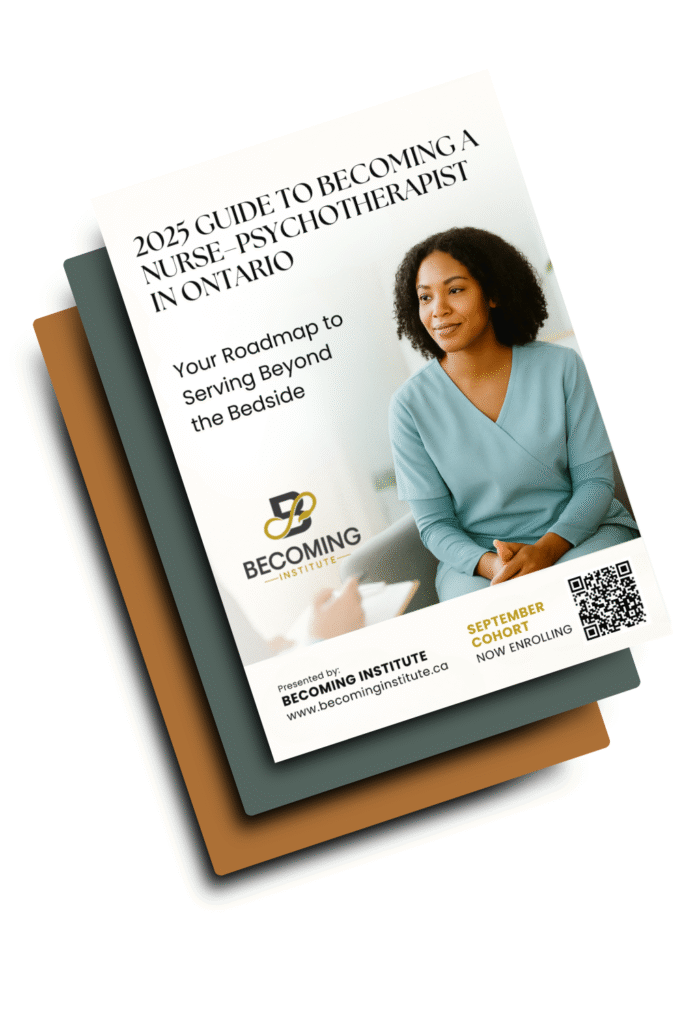Choose Your Path

3-Day Becoming Method® Intensive Training

RN-Psychotherapist Program
🕒 6–8 Months
On-line + Live 3-Day Intensive
For Registered Nurses including NPs, CNSs & PSWs
Apply Now


🕒 6–8 Months
On-line + Live 3-Day Intensive
For Registered Nurses including NPs, CNSs & PSWs
Apply Now
Why Symptom-Focused Therapy Isn’t Enough—And How the Becoming Method® Supports Full-Spectrum Trauma Recovery
A White Paper On Full-Spectrum Trauma Recovery
By Dr. Joan Samuels-Dennis, RN-Psychotherapist
Updated July 2025
In every health discipline, there comes a moment when the work asks us to deepen our approach.
Over the past century, psychotherapy, mental health care, and nursing practice have evolved through profound shifts in understanding—from the intrapsychic insights of early psychoanalysis to the neurobiological and relational wisdom of trauma-informed therapy. Today, thousands of skilled practitioners—including psychotherapists, nurse practitioners, clinical social workers, psychiatrists, and physicians—guide clients through evidence-based approaches that regulate the nervous system, reframe cognition, and restore functioning after adversity.
These frameworks are effective. They help stabilize what has been destabilized. Clients move from dysregulation to regulation—from overwhelm to emotional safety. Cognitive distortions realign. Relationships begin to repair. Functionality is restored. And for a time, this is enough.
But eventually, something else emerges.
Not more pain—something more complex: a search.
Across therapeutic modalities, clinicians witness this moment. Clients no longer present with acute distress, yet they remain in therapy. They feel better—but not whole. Regulated—but not fully alive. A deeper line of inquiry begins to take shape—not from suffering, but from longing:
Who am I, really?
Why did this happen to me?
What does it mean to live a meaningful life now?
And what am I now free to do?
These are not signs of regression. They are signs of emergence.
They are not questions of coping.
They are questions of becoming.

Submitted to:
College of Nurses of Ontario (CNO)
College of Registered Psychotherapists in Ontario (CRPO)
Public Health Agency of Canada
Chief Medical Officer of Health, Ministry of Health in Ontario
Registered Nurses Association of Ontario (RNAO)
Canadian Nurses Association (CNA)
Psychotherapy is a cyclical process from isolation into relationship.’ It is cyclical because the patient, in terror of existential isolation, relates deeply and meaningfully to the therapist and then, strengthened by this encounter, is led back again to a confrontation with existential isolation.
-Yalom, 1980, p. 406
Most traditional therapy models are not designed to support this phase of healing. They guide individuals through recovery, but fall short when clients are ready to rebuild identity, clarify life purpose, or explore post-traumatic growth. Clinicians, too, encounter a quiet impasse: how to accompany someone not just out of pain—but into alignment, meaning, and contribution.
The Becoming Method® emerges in response to this gap. Grounded in over two decades of clinical application, systems-level consulting, and psychospiritual integration, it offers a structured articulation of a natural post-trauma trajectory—one that many clients already move through, whether consciously or unconsciously.
It recognizes that healing is not a linear outcome, but a dynamic process—one that unfolds across changes in nervous system regulation, identity formation, relational capacity, and spiritual orientation. This process maps across five key stages of full-spectrum trauma recovery:
1. Traumatic Wounding: Marked by dysregulation, somatic imprinting, fragmentation of self-concept, and relational disconnection. This is the rupture that initiates the journey.
2. Existential Inquiry and Identity Reconstruction: Clients begin to reassess belief systems, process meaning, and reconstruct identity—not by returning to a pre-trauma self, but by moving toward deeper internal coherence.
3. Self-Discovery and Narrative Integration: Through trauma-informed storytelling, truth-telling, and shadow work, individuals integrate disowned or suppressed parts of the self—restoring congruence across their lived experience.
4. Purpose Clarification: With clarity comes direction. Clients begin to sense their core values, unique gifts, and contribution to the world—often shifting from survival mode to purpose-driven living.
5. Functional Integration and Embodied Contribution: Healing is enacted. Insight becomes action. Purpose is expressed in daily life, leadership, creativity, and relationships—a movement toward self-authorship, generativity, and community impact.
What distinguishes the Becoming Method® is its ability to hold the full arc of the healing journey—from crisis to coherence, from emotional regulation to spiritual integration, from self-repair to self-actualization.
It supports individuals and clinicians alike by integrating three domains of trauma-informed care:
Traumatic Wound Healing: Grounded in somatic therapy, relational attunement, and evidence-informed modalities, this phase supports nervous system regulation, emotional stabilization, and reconnection to the body.
Self-Discovery and Transformation: Practitioners guide clients through narrative reframing, forgiveness processes, and identity reconstruction—helping them recover the “self beneath the story.”
Purpose Discovery & Integration: Clients begin to embody their purpose through service, leadership, creative expression, or caregiving—transforming inner work into external contribution.
This isn’t a fragmented or refer-out model.
The Becoming Method® is a unified care framework.
It combines the depth of psychotherapy, the future-focus of coaching, and the relational wisdom of mentorship—designed for nurses, NPs, physicians, social workers, and mental health professionals who want to deliver holistic trauma-informed care with coherence and impact.
Whether you’re a public health nurse, primary care provider, or community health practitioner, this model equips you to walk alongside clients through all phases of trauma recovery—not just stabilization, but transformation and self-actualization.
For regulators, educators, and system leaders, the Becoming Method® also provides a blueprint for trauma-informed system design—one that supports staff retention, reduces burnout, and promotes healing-centered care at scale.
The Becoming Method® is a comprehensive model for human development.
It speaks to clinicians who feel there’s more to offer.
It speaks to clients who feel there’s more to become.
Understanding why people suffer, how they change, and how to help them live satisfying lives is a fascinating and important undertaking.
-Sommers-Flanagan, 2018
The Becoming Method® is a holistic psychotherapeutic approach—structured, integrative, and rooted in consciousness. In our practice, we define consciousness as the capacity to observe oneself in the moment—and to think, feel, speak, and act in alignment with who one truly is. From the very first session, clients are invited to bear compassionate witness to their inner world without being overwhelmed by it. They learn to respond with intention rather than react from habit, and to live from essence rather than from the conditioning of trauma, culture, or history.
The Becoming Method® is not a linear intervention. It is a circular, relational process that supports the individual across the full arc of trauma healing, identity integration, and purposeful living. At its core, the method offers a profound reorientation: trauma is not simply an event or diagnosis—it is a state of disconnection from the self. Healing, then, is the process of reconnection—to the body, to truth, to others, and to the universal whole.
The Becoming Method® engages multiple dimensions of human experience—biological, psychological, intergenerational, and spiritual. Rather than focusing solely on stabilisation or symptom reduction, the method moves further. It invites clients into an energetic and existential transformation that culminates not just in relief—but in direction, meaning, and contribution.
It is a model that honours the sacredness of each individual’s journey—and equips clinicians to walk beside their clients not only through crisis and coping, but through the deeper work of self, relational, and collective awakening. It supports a movement toward alignment with truth, coherence of identity, and the full actualisation of one’s place in the world.
In trauma recovery, the journey toward reconnection is not linear—it is relational, layered, and profoundly personal. The Becoming Method® supports this journey by introducing four foundational, trauma-informed questions. Used across all phases of the therapeutic process, these questions are more than reflective prompts—they are transformative tools that unlock memory, meaning, and emotional healing.
The Four Foundational Questions:
These questions emerge from the body’s wisdom and the client’s own inner healer. They are universal—not bound to any single therapy modality—and when held within a trauma-informed, consciousness-based framework, they offer access to profound emotional regulation, identity integration, and nervous system healing.
Each question is embedded in a structured therapeutic process involving somatic awareness, applied kinesiology, and guided dialogue. Using these tools, clinicians help clients trace the energetic imprint of trauma to its root, identify unresolved relational dynamics, and reprocess core memories through a technique known as conscious forgiveness.
This is not talk therapy alone—it is embodied psychotherapy, integrating nervous system regulation, conscious forgiveness, and spiritual reconnection. As the client begins to forgive—not only others but themselves—they release distorted beliefs, resolve internal conflict, re-frame the narrative, and return to a coherent sense of self.
Clients describe this moment as cathartic—clear, grounding, and quietly profound.
They begin to recognize the thoughts that once burdened them—and the ones now anchoring their breakthrough.
Peace returns. At first, it flickers. But with time, it settles into something steady, solid, and unshakable.
Healing is not about fixing what is broken. It is about reuniting what has been separated. It is about remembering who we were before the wound—and choosing who we now become.
-Dr. Joan
The Becoming Method® emerges not as a departure from the psychotherapeutic tradition, but as an integrative synthesis—one that weaves together decades of theoretical insight and clinical practice into a coherent, evolution-oriented framework. It does not reject established models; it draws from them, honoring their contributions while addressing the existential, intergenerational, and spiritual dimensions that many approaches leave unintegrated.
Where many trauma-informed models emphasize nervous system regulation and symptom stabilization, the Becoming Method® moves into the deeper work of narrative coherence, spiritual reconciliation, and identity reconstruction. It engages both intrapsychic and systemic forces—guiding clients not only through internal healing, but toward expanded purpose, relational integrity, and contribution to the world.
Over the past 50 years, psychotherapy has become increasingly specialized. While this has produced significant innovation, it has also led to fragmentation—splitting emotional from somatic work, intrapsychic from relational, and healing from meaning-making. Clinicians often find themselves piecing together disparate models, hoping to meet the complexity of trauma without a unified map.
The Becoming Method® responds to this challenge by offering a comprehensive, phase-based model that:
The Becoming Method® offers an integrated path—one that unifies symptom relief with meaning-making, somatic healing with truth-telling, and therapeutic depth with connection and interconnection. It honours the full spectrum of human experience, empowering clinicians to support healing not in parts, but as a coherent, unfolding whole.
Domain | Established Lineage | Becoming Method® Integration | Key Innovations |
Somatic Trauma Work | Levine (SE), Ogden (SP), van der Kolk | Uses body memory as the primary guide; begins each session with somatic anchoring and intention setting | Incorporates applied kinesiology to access energetic imprints of trauma |
Narrative & Meaning | White & Epston, Neimeyer, Meichenbaum | Sessions center around reframing trauma narratives and restoring coherence | Introduces 4 foundational questions to guide narrative re-authoring at a soul level |
Internal Parts Work | Schwartz (IFS), Ego-State Therapy | Engages fragmented parts through relational inquiry and compassionate witnessing | Adds transgenerational dialogue and forgiveness protocol to support reintegration |
Interpersonal Neurobiology | Siegel, Cozolino | Emphasizes relationship as regulation and reflection; therapist as attuned co-regulator | Expands into energetic fields and spiritual resonance between client and clinician |
Existential & Depth Psychology | Jung, Yalom, Frankl | Central focus on meaning, archetypes, and transformation of identity | Frames trauma as disconnection from soul purpose, and healing as reconnection |
Transpersonal Psychology | Assagioli, Wilber, Maslow | Supports client’s movement into unity consciousness and peace states | Normalizes mystical/transcendent experiences in the therapy room |
Family Systems & Intergenerational Trauma | Bowen, Bert Hellinger, Yehuda | Examines inherited beliefs and unconscious loyalties through systemic mapping | Offers energetic release of patterns through forgiveness and conscious narrative completion |
Developmental Psychology | Kegan, Loevinger, Maslow | Tracks movement from self-protective to self-authoring and self-transforming identity | Reframes recovery as a gateway to generativity and post-traumatic growth |
The Becoming Method® offers a trauma-informed, consciousness-based care model that speaks directly to the challenges nurses and physicians face in modern clinical settings. Its strength lies in its capacity to hold both the structural realities of health systems and the sacred inner experiences of patients—integrating medical, psychological, and spiritual dimensions of care.
Rooted in clinical practice and systems thinking, the Becoming Method® recognizes that trauma is not merely an individual or psychological event, but a systemic disruption—shaped by social inequities, cultural silencing, intergenerational legacies, and chronic stress within health environments. It honours the biological realities of trauma while making space for identity, meaning, and inner truth to emerge.
Where traditional care models often draw a line between trauma recovery and spiritual awakening, this method brings them together. It sees trauma not just as a clinical diagnosis but as a rupture in consciousness—a disconnection from purpose, self, and the body’s inherent intelligence. In this light, healing becomes a process of reconnection and restoration, not just regulation or symptom management.
This integrative model provides clinicians, public health professionals, and physician leaders with a new roadmap—one that’s trauma-informed, evidence-aligned, and spiritually attuned. It supports regulated health professionals to walk alongside patients not just through illness or crisis, but through growth, insight, and transformation.
For nurses and physicians ready to deliver care that reaches beyond stabilization and into meaning and purpose, the Becoming Method® offers both a framework and a practice—grounded, rigorous, and deeply human.
Nothing ever goes away until it has taught us what we need to know.
-Chödrön, 1997
The Becoming Method® is not just a psychotherapeutic model—it is a scalable trauma-informed framework built to meet the complex demands of health and social systems. Developed over two decades, it responds directly to the challenges facing today’s leaders: burnout, trauma saturation, system fragmentation, and rising demand for integrated, purpose-driven care.
Grounded in consciousness-based practice, the Becoming Method® addresses trauma at its roots—biological, psychological, intergenerational, and systemic—and offers a structured approach to healing that can be adapted across sectors.
🩺 In primary and community health, it equips nurses, nurse practitioners, physicians, and allied providers with tools to move beyond symptom management—bringing meaning-making, narrative reframing, and nervous system regulation into the clinical encounter.
🏫 In education, it enables teachers, guidance counselors, and mental health staff to recognize trauma-informed learning needs, apply restorative practices, and shift from compliance to relationship-based care.
⚖️ In justice and corrections, it reframes criminalized behaviours as trauma responses—supporting identity reconstruction, emotional regulation, and pathways to social reintegration.
🏥 In public health and hospital systems, it addresses workforce burnout, moral distress, and vicarious trauma—supporting long-term workforce sustainability and emotional resilience.
What emerges is not just a new protocol—but a new paradigm for system-wide healing. The Becoming Method® is both rigorous and relational—offering an evidence-informed, spiritually-attuned model that aligns with:
Trauma-informed systems design
Workforce development and retention strategies
Interdisciplinary mental health training
Equity-informed public policy
Holistic care delivery models
As post-COVID realities escalate demand on already strained systems, policymakers, health administrators, and institutional leaders are seeking grounded, scalable, and innovative approaches to trauma recovery. The Becoming Method® meets this moment.
It supports systems not just to function—but to evolve.
We are actively partnering with leaders in healthcare, education, justice, and public health to pilot, study, and adapt the method in diverse real-world settings.
If you’re designing for long-term healing—not just crisis response—this is your invitation to co-create with us.
Whether you’re an experienced psychotherapist refining your approach, a nurse exploring psychotherapy as a next step, or a new mental health clinician drawn to more integrative ways of working—this is for you.
You may sense what your clients often express: that while symptom relief is important, something deeper is asking to be addressed—a desire for coherence, purpose, and long-term transformation.
The Becoming Method® is not here to replace what you already do well—but to expand it.
Designed for those who want to integrate somatic therapy, narrative processing, and trauma-informed care, this method supports healing beyond crisis stabilization. It’s for clinicians who recognize that true trauma recovery involves not just managing distress, but restoring identity, meaning, and connection.
Many practitioners come to this work not because they lack clinical tools—but because they’re seeking a model that brings it all together. One that is psychospiritually grounded, body-aware, and aligned with their deepest purpose as healers.
If you’re ready to:
…then the Becoming Method® offers a structured, integrative pathway into full-spectrum care.
If you’re searching for a way of working that aligns with your ethics, energy, and evolution as a clinician—there is a next step for you here.
It seems to me that the good life is not any fixed state. […] The good life is a process, not a state of being. It is a direction, not a destination.
-Rogers, 1961/1995
Explore Our Training Pathways
Our training programs are designed to help you deliver trauma-informed, full-spectrum care—while deepening your presence, expanding your scope, and aligning your practice with the deeper healing you know is possible.
The 3-Day Becoming Method® Intensive is your entry point into one of Canada’s most innovative trauma recovery models. This foundational training gives practitioners a powerful, practical framework for helping clients move beyond symptom management—toward long-term healing and transformation.
Who This Training Is For:
✅ RNs including Nurse Practitioners (NPs) and Clinical Nurse Specialists (CNSs) looking to expand into psychotherapy or trauma-informed care
✅ Psychotherapists, Registered Social Workers, Counsellors, and Psychologists seeking full-spectrum trauma recovery tools
✅ Physicians, Primary Care Providers, and Public Health Clinicians addressing mental health in frontline or community-based settings
✅ Personal Support Workers (PSWs), Wellness Coaches, Spiritual Directors, and Community Healers integrating holistic, client-centred healing
✅ Students and early-career professionals in health, mental health, or human services exploring trauma-informed, consciousness-based practice
🔍 What You’ll Learn:
⏳ The core principles of The Becoming Method®
⏳ How to identify and map the full arc of trauma recovery—from dysregulation to reintegration
⏳ How to guide clients through the Four Foundational Questions that unlock memory, insight, and healing
⏳ How to facilitate conscious forgiveness and emotional release
⏳ Techniques to deepen client transformation using narrative, somatic, and systems-informed tools
📜 Includes:
📜 3 days of immersive, instructor-led training (live or virtual)
📜 Certificate of Completion (eligible for CE hours)
📜 36 CE Credits
📜 Alignment with CRPO competencies (SEUS – Safe & Effective Use of Self)
📜 Optional progression into the full RN–Psychotherapist Credentialing Program
Click Here to Learn More
Across Canada, health, education, and justice leaders are confronting unprecedented levels of stress, burnout, and complexity. At the Becoming Institute, we help teams move from survival mode to strategic transformation—embedding trauma-informed, healing-centered care into the heart of their systems.
Whether you’re seeking a single workshop or a full-scale implementation strategy, we tailor trauma-informed training workshop to meet your organization’s real-world pressures and goals.
✅ Keynote Talks & Awareness Sessions (1 hour)
High-impact, engaging presentations designed to spark insight and shift mindset. Ideal for executive retreats, staff town halls, and DEI or wellness initiatives seeking to introduce trauma-informed principles.
✅ Foundational Trainings (2 hours)
Build shared language and awareness around trauma, regulation, and emotional safety. Perfect for staff meetings, onboarding refreshers, or professional development days.
✅ Half-Day Workshops (3.5 hours)
Equip teams with practical tools through interactive learning, real case reflections, and dialogue. Supports immediate application in clinical, educational, or frontline environments.
✅ Full-Day Intensives (6–7 hours)
For organizations ready to go deeper. These sessions support culture repair, team restoration, and improved care delivery. Ideal for leadership teams, educators, and clinical groups working in high-impact settings.
Strategic Consulting & Implementation Pilots
Go beyond one-off sessions with a structured 3-phase rollout that builds internal capacity and long-term resilience.
Click Here to Learn More
The RN–Psychotherapist is not a generalist role. It requires advanced competencies in counselling theory, therapeutic use of self (SEUS), and trauma-informed care across biological, psychological, spiritual, and systemic domains. Training nurses for this work isn’t about adding a course—it’s about rethinking how we structure scope, sequence, and delivery.
We collaborate with academic teams to design RN-Psychotherapist Credentialing Program.
What We Offer Tiered Consulting & Co-Design Support that first assess your capacity to delivery the program and map your current nursing curriculum against the competencies required for psychotherapy practice—aligned with CNO and CRPO expectations.
Through this process, we initiate a broader strategic conversation about your institution’s capacity to offer regulation-aligned, trauma-informed training.
✅ How your current courses support—or fall short of—psychotherapy-specific learning outcomes
✅ What additional content, sequencing, and practicum structures are needed
✅ Whether faculty are equipped—or can be supported—to teach psychotherapy
✅ Which delivery model fits best (post-grad certificate, CE microcredential, full credentialing pathway)
✅ How to build internal capacity—faculty, systems, supervision, partnerships—to sustain this innovation
Curriculum mapping is the first step in developing the internal readiness to deliver something transformative.
Colleges, universities, and academic leaders who are:
God grant us the serenity to accept the things we cannot change; the courage to change the things we can; and the wisdom to know the difference.”
-Niebuhr, as cited in Schaffner, 2021, p. 38
We are now inviting Ontario’s most visionary leaders, educators, researchers, regulators, and funders into this work.
Why? Because real change won’t happen in silos. It will take public systems, academic institutions, community organizations, and government working together to shift what’s possible.
The Becoming Method® offers a scalable, trauma-informed solution that directly supports Ontario’s health system transformation over the next four years.
As outlined in the Roadmap to Wellness, Ontario is focused on building a comprehensive, connected, and high-quality mental health and addictions system. The Becoming Method® contributes to this vision by offering a full-spectrum trauma recovery framework—one that integrates biological, psychological, intergenerational, and spiritual healing across clinical and community settings.
The Public Health Ontario Strategic Plan (2024–2029) calls for health system modernization, workforce development, and a renewed emphasis on equity and upstream prevention. The Becoming Method® meets these goals by:
Embedding healing-centred, trauma-informed care into public health and primary care teams
Supporting workforce retention and emotional sustainability for nurses, PSWs, and physicians
Promoting community resilience and collective healing through accessible, culturally attuned care pathways
Aligned with the Ministry of Health’s Priorities (2024–2026), the method offers a practical, regulation-aligned training program that supports timely access to care, expands mental health capacity across disciplines, and empowers providers to offer safe, effective psychotherapy within their scope.
In doing so, the Becoming Method® is not just a model of care—it’s a catalyst for system-level transformation. It supports Ontario’s long-term vision for an equitable, responsive, and healing-centred health system—one where every clinician is equipped to walk with individuals through trauma recovery, identity integration, and the return to meaning.
The Becoming Method® is not just a therapeutic toolkit—it is a provincial-level strategy aligned with Ontario’s 4-year mental health and public health goals:
Provincial Goal | How the Becoming Method® Aligns |
|---|---|
Mental Health Integration | Offers scalable practitioner credentialing to increase access in underserved areas |
Burnout & Workforce Sustainability | Provides trauma-informed training and self-care frameworks for long-term clinician resilience |
Regulatory Compliance | Supports regulated psychotherapy credentialing pathways recognized by CNO/CRPO |
Evidence & Accountability | Embeds measurement of trauma recovery, system usability, and provider retention consistent with provincial metrics |

In just 12 Months, start your new career as a Certified Trauma Recovery Specialist.



Introduction to Psychotherapy


Mindful Fitness: SelfHealing Practices for Psychotherapists


Forgiveness & Holistic Trauma Recovery


Ubuntu: African & Indigenous Ways of Knowing & Being


Introduction to Psychotherapy


Mindful Fitness: SelfHealing Practices for Psychotherapists


Forgiveness & Holistic Trauma Recovery


Ubuntu: African & Indigenous Ways of Knowing & Being